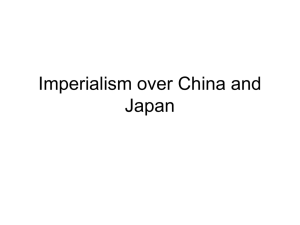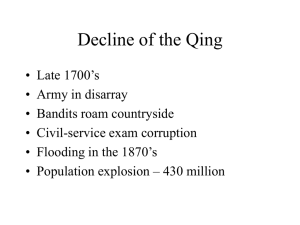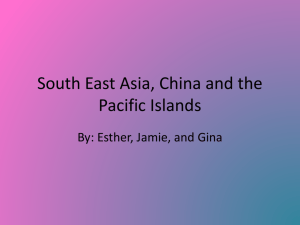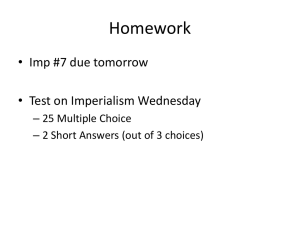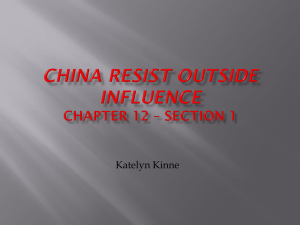Imperialism over China and Japan
advertisement
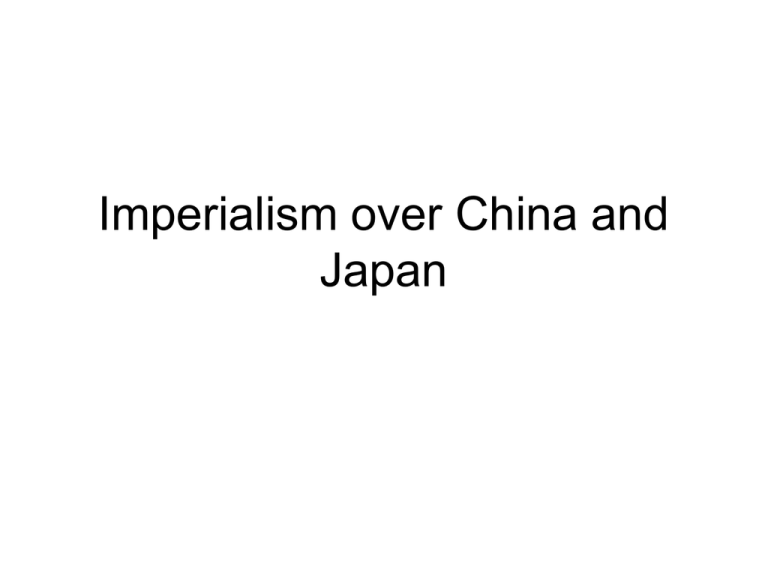
Imperialism over China and Japan ‘LOST BOY’ OF SUDAN AT SENECA RIDGE The Seneca Ridge Middle School Library will present Jacob Atem, one of the original “Lost Boys of Sudan” at 6:30 p.m. Thursday, March 6th. The Lost Boys of Sudan is the name given to the groups of more than 20,000 boys of the Nuer and Dinka ethnic groups who were displaced and/or orphaned during the Second Sudanese Civil War (1983 to 2005); about 2.5 million were killed and millions were displaced. Atem will share his experience about his journey from Sudan to Ethiopia to Kenya and finally to the United States. In this powerful celebration of learning and heartfelt gratitude to his roots, he will tell a story that is as unique as any you've ever heard. This event, in partnership with the nonprofit organization Sudan Sunrise, is part of the Step Up Loudoun Youth Competition and is free to the community. Agenda 1. What is gained by the United States after the SpanishAmerican War in 1898? (5) 2. Notes: China and Japan, Spheres of Influence (15-20) 3. Compare and Contrast China and Japan (10) 4. Propaganda: Racism and bias in Japan (25) 5. Topic for Writing Exercise next class (3) 6. Objective Review: Imperial Ambitions of Japan and China. (10) Objective: Students will analyze the impact of Colonialism and resistance from China and Japan. Chinese Isolation • Chinese felt they were superior. • When presented with Western Technology, Chinese not interested in “gadgets” • China is self-sufficient, no need for connections to outside world. • Extensive food supply, along with manufacturing. Opium War • Limited trade with the West. • European merchants started trading opium for tea. • Opium War begins in 1839. • Chinese ships no match for steamboats of Britain. • Treaty of Nanjing gives Hong Kong to Britain, other countries granted trade rights with China. (1844) Problems in China • Chinese hated the new foreigners. • Food production was stagnant, led to starvation. • Huang He River… • Taiping Rebellion = “Great Peace” – Hong attempted to have a new government take China. (Failed after 14 years) Reform • Rebellions and War stress the Chinese Government. • Cixi would resist change, advocating only selfstrengthening movements. • Sphere of Influenceforeign nations control trade and investment. • Open Door Policy started to preserve American trade interests. Chinese Nationalism • Guangxu attempts to modernize China, but his Aunt Cixi quells the notion and kills the supporters. • Peasants tired of foreign privilege and Cixi launched Boxer Rebellion. • Empress showed support for rebellion, but provided no military power. • Multinational force ends the rebellion. Japan Ends Isolation • Matthew Perry shows up with an offer. – Free trade between America and Japan. – Perry would return with a “large” fleet to get their answer. • Treaty of Kanagawa opened two ports for American ships. Reform and Modernization • Meiji reign promotes Enlightenment. • All land is given to the emperor. • Modernized Japan by sending scholars to study western culture and technology. • Adopted a strong military, and free public education. • Industrialization follows. Japanese Imperialism • Strongest military in Asia. • Many nations abolished extraterritorial rights in Japan, feeling that Japan is westernized. • Sino-Japanese War (1894) gives Japan several colonies. • Russo-Japanese War gave Japan Manchuria. • Korea now a protectorate of Japan. • Imperialists, they made Koreans learn Japanese Customs and language. Japanese Propaganda • Each student will receive a print of the Russo-Japanese War. For these prints, you must tell me what is going on in the print, and is there bias towards one specific group. Then you must explain why. Topic for article next class • Next class you will have a timed 30-minute write on the following topic, you will receive the specific question on the day. The article will be required to provide evidence for your argument. • Topic: The spread of African language and changes in appearance over time. Quick Questions 1. 2. 3. 4. 5. 6. 7. Why did the Chinese resist Western influence? Why did the Opium War occur? What are Spheres of Influence? What is an open door policy? Why does Japan end isolation? How does Japan become an imperial power? Who does Japan attempt to conquer in their military conquests?
